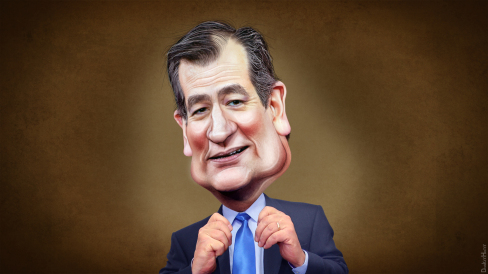If the 2016 presidential election ends up getting a chapter in future U.S. history books, as we predict it very well might, then the Iowa caucus will be deserving of at least a page. Ted Cruz secured a victory in Monday night’s caucus, narrowly snatching the win from Donald Trump, who had been leading in the Iowa polls.
Going into the primaries, Trump, as the frontrunner of the Republican Party, is the elephant in the classroom, lunchroom and dorm room, as his exceedingly brash statements have earned him media ridicule and surprising support across state borders. While Ted Cruz may seem tame compared to the real estate mogul, his character appears to be no more upstanding; he tried to shut down the government over Obamacare and, just yesterday, issued an apology to Ben Carson for falsely telling Iowa caucus voters that the neurosurgeon was planning to quit the race. However, a win for the bigoted Trump would have been earth-shattering and embarrassing. The Republican party was spared from that.
In the Democratic Party, Hillary Clinton and Bernie Sanders were head-to-head until the end, with Clinton winning by decimals of a percentage — a shock to many following months of Clinton maintaining a solid lead. A strong performance by Sanders can reasonably accomplish two things: it advances him towards the White House, and it assures that even if he does not make it all the way there, Clinton will not be able to ignore the criticisms directed toward her and her campaign by Republicans or Sanders’ supporters in the coming months.
As is typical of the primaries, and evident in the multi-candidate Republican Party, radicalist ideals are capturing coveted votes and moderation is difficult to find. More moderate candidates, such as John Kasich and Marco Rubio, were unable to capture the same amount of delegates on their side. The exception, of course, is Clinton, who may not be moderate by moderate standards but is seen as such when compared to the likes of Sanders.
It is hardly objectionable that most of the Iowa caucus’ hype is due to its timing, as Iowa is the first state to cast its votes. But this year, the Iowans should serve as an inspiration to Fordham students eligible to vote and to the country as a whole. The Iowans were excited and enthusiastic, their choices fostered continuous debate and they turned up in record numbers in a time where civic engagement is strikingly low.
For the majority of Fordham students, the November 2016 presidential election will be the first that we can actively participate in. Whoever wins the presidency is sure to impact our young adult lives in drastic ways both in college and well afterwards. We can fight the stigma that college students do not care about politics and are not as aware of the issue that the candidates are talking about. We can do it by educating ourselves, voting in primaries, voting in the general elections and casting absentee ballots. Come April, let us be Iowans.





